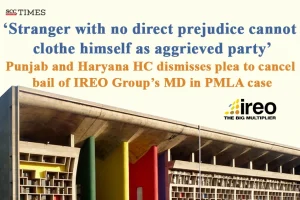Punjab and Haryana High Court: A petition was filed by an advocate, under Section 483(3) of the Bharatiya Nagarik Suraksha Sanhita, 2023 (‘BNSS’) seeking cancellation of the bail granted to the Managing Director (‘accused’) of the IREO Group, in public interest, in FIR under Sections 406, 420, 467, 468, 471 of the Penal code, 1860 (‘IPC’). A Single Judge Bench of Manjari Nehru Kaul, J., while dismissing the petition, held that a stranger with no direct prejudice could not clothe himself with the status of an ‘aggrieved party’ and invoke the jurisdiction of this Court.
Background
In the present case, the petitioner contended that the accused had abused the concession of bail by disposing of valuable assets of the IREO Group in contravention of the restraint imposed by this Court that no property be alienated. It was alleged that large parcels of land were sold to Oberoi Realty Ltd. and DLF Home Developers Ltd. for consideration running into hundreds of crores of rupees. It was further urged that a share transfer, antedated and purportedly in favor of the mother of the accused and valued at nearly Rs 10,000 crores was uploaded belatedly on the MCA website, which suggested a deliberate attempt to circumvent the order of this Court. The petitioner argues that such conduct displayed scant regard for the majesty of law.
The petitioner, styling himself as a practicing Advocate and a prospective home buyer, submitted that inaction on the part of the Enforcement Directorate (‘ED’) had constrained him to invoke the extraordinary jurisdiction of this Court in the larger public interest.
When specifically queried by the Court whether he was the complainant in the scheduled offences or a directly aggrieved victim, the learned counsel candidly answered in the negative. The petitioner’s case rested on his claim that any citizen may approach the Court to point out abuse of process.
Per contra, the accused raised objection to the maintainability of the petition on the ground of lack of locus standi. He contended that the petitioner was neither a victim, an investor, nor an allottee in any project of the IREO Group. Further, the Delhi High Court and the ED had objected to the locus of the present petitioner as well and the Bar Council of India (‘BCI’) had directed removal of his name from the Roll of Advocates on account of deliberate concealment of criminal antecedents and irresponsible, defamatory conduct.
The ED emphasised that the petitioner filed multiple petitions before different forums alleging inaction on its part but no order favoring him had been passed in any of them.
Issues, Analysis and Decision
Relying on Sanjai Tiwari v. State of UP, 2020 SCC OnLine SC 1078, the Court emphasised that only the person directly affected and who could establish a real grievance was entitled to seek cancellation of bail. The Court stated that a stranger with no direct prejudice could not clothe himself with the status of an ‘aggrieved party’ and invoke the jurisdiction of this Court.
Further, the Court stated that cancellation of bail stood on a different footing from the grant of bail and once liberty had been secured by a judicial order, it could be recalled only upon strict proof of misuse, such as tampering with evidence, intimidating witnesses, or obstructing the course of justice. Mere allegations of financial transactions, however serious, would not justify cancellation of bail unless they constitute a violation of bail conditions or demonstrably prejudice the investigation.
The Court opined that in the petition at hand, no such circumstance was shown as the sole surviving condition of bail as modified by the Supreme Court required the accused to mark weekly presence before the ED, which was duly complied with. Further, the Court specified that the ED itself had not sought cancellation and had been unable to identify any supervening circumstance or fresh material post-grant of bail to warrant such relief.
The Court noted that the stand of the ED that “no prejudice would be caused” if bail were cancelled was an evasive formulation, for the true test was not whether cancellation would inconvenience the agency, but whether there was tangible misuse of liberty and opined that no such misuse had been established in the present case.
The Court observed that the bona fides of the petitioner stood seriously undermined as multiple forums like Delhi Police, Gurugram Police and Delhi High Court found him lacking locus as well as credibility. The Court emphasised that his previous petitions had been dismissed with costs, and the BCI had directed removal of his name from the Roll of Advocates. Therefore, the Court opined that the petitioner could not seek to revive the same cause under the garb of public interest. Accordingly, the Court dismissed the petition as it was not maintainable and no ground for cancellation of bail was made out.
[Gulshan Babbar v. Lalit Goyal, 2025 SCC OnLine P&H 9062, decided on 17-9-2025]
Advocates who appeared in this case:
For the Petitioner: Pardeep Solath, Advocate, Vinod Ghai, Senior Advocate, G.K. Mann, Senior Advocate, Arshdeep Singh Khurana, Gurmohan Singh Bedi, Pawandeep Singh, and Anand Vardhan Khanna, Advocates
For the Respondent: S.V. Raju, Additional Solicitor General of India, Zoheb Hossain, Special Counsel, Lokesh Narang, Senior Panel Counsel and Meghna Malik, Senior Panel Counsel


